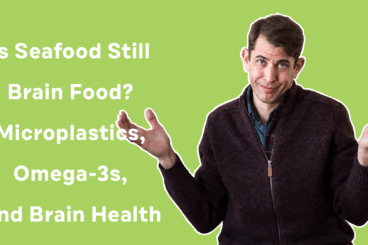What is nutritional psychiatry?
If you’ve read about how omega-3 fats can benefit brain health or how the gut microbiome impacts depression, you are reading about nutritional psychiatry. This emerging area of attention in mental health seeks to understand how our food impacts our brain health and how this research can be translated to clinical care, both for prevention and treatment.
Today we are beginning to understand the power of food with exciting new research and near daily headlines about mental health and nutrition. I wrote my first Brainfood Prescription in 2007, a simple list of five foods on a small piece of paper. A young man with depression asked me what he could eat to help with his mood.
Avocado
Lentils
Mesclun
Lox
Yogurt
Little did I know that the way I practiced psychiatry was about to change.
In 2012, I was on a conference call with the top international researchers in nutrition and brain health. We were discussing the formation of a new organization called the International Society of Nutrition and Psychiatry Research.
I was thrilled to have that conversation because I felt a bit alone as a psychiatrist speaking with patients about nutrition. We weren’t taught to talk with patients about what they eat, so as mental health professionals we don’t ask. I wondered why not. After all, nutrients play a vital but often-overlook role in mental health, yet at that point we had more or less neglected the key aspects of nutritional psychiatry.
Recently, I’ve been asked a lot of questions about Nutritional Psychiatry and our work. It’s been exciting to be quoted in the New York Times as a pioneer in this field, it has also given me a sense of responsibility in clarifying the appropriate use of nutrition to help people with mental health concerns.
As research helps us better understand the biological underpinnings of depression, there are new factors that we think drive depression. Things like inflammation, brain plasticity and function, the biology of psychological stress, and the nuances of the brain-gut connection. All of these processes are deeply biologically interwoven with our food.
Yet, we lacked any evidence-based primary prevention and treatment strategies based on dietary modifications to alleviate depression. And the studies that did look at the connection between diet and depression mostly focused on individual nutrients or food groups like folate or omega-3 fats. It is important science but provided an incomplete picture. After all, we don’t eat foods or nutrients in isolation we eat a “dietary pattern” ideally of diverse foods. Focusing on a single factor, be that vitamin B12 or cholesterol, neglected the complex interactions among nutrients in our daily diet.
Putting Nutritional Psychiatry on the Map
A 2010 study changed that perspective. Pioneering Nutritional Psychiatry researcher Felice Jacka, Ph.D and her colleagues looked at diet quality and mental disorders among Australian women and in the American Journal of Psychiatry concluded that “a better diet quality would be associated with a lower likelihood of depressive and anxiety disorders and with fewer psychological symptoms.”
After adjusting for other variables, participants showed a 35% reduced risk for major depression and a 32% reduced risk for anxiety disorders with a healthy diet consisting of vegetables, fruit, beef, lamb, fish, and whole-grain foods.
A western diet, on the other hand, increased their odds for major depression.
This was the first study in the premiere academic journal of psychiatry to show the significant impact of diet quality on mental health. Unlike many other risk factors for depression and other mental disorders, your diet is entirely modifiable. This was a cross-sectional study, a far cry from the randomized trials needed to change how we practice clinically, but it was significant for me.
My Shift into Nutritional Psychiatry
In my practice during that time, I was prescribing medications and doing talk therapy.
In many ways I am a classic Columbia-trained Psychiatrist, I do a lot of psychotherapy and I am handy with medications. I care about evidence and excellent patient-based care. For my own mental health, I was riding my bike all over New York City and eating a plant-based diet. The incongruence struck me. We had not been taught as physicians and psychiatrists to focus on these factors much with patients. It seemed something was missing to help my patients, who were struggling with anxiety, depression, and other mental disorders. I talked a lot about symptoms, but not very much about lifestyle factors like nutrition, exercise, and spirituality.
As I researched my first book The Happiness Diet, I read everything I could about brain nutrition. For the first time, I learned the history of how our food has changed, as we wrote, “more in the last 100 years than in the last 100,000.” So many of my patients were eating low-fat diets and fearing cholesterol. In fact I had been a low-fat vegetarian for almost a decade myself. As I learned more about the flawed science and policy that was guiding how the medical system was interacting with the food system, I reached a clear conclusion. Modern food puts our mental health at risk. T
And increasingly, that’s what the data was showing. A prospective study in 2009 showed that in 10,094 university students those who adhered most closely to a Mediterranean dietary pattern had a 52% reduced risk of depression.
Evidence like this encouraged me to continue evaluating the eating habits of my patients and to learn as much as possible about what I should recommend that they consume based on the evidence.
I began incorporating brain-nourishing food choices with “building-block” nutrients such as long-chained omega-3 fats, vitamin B12, and zinc. More new science was suggesting that these same foods would help my patients’ brains be more resilient by enhancing brain growth. (The latest brain research tells us that human brains continue to grow through adulthood, creating new brain cells and new connections via a hormone called BDNF.)
On top of that, eating more of these brainfoods would decrease my patients’ risk of obesity, diabetes, and heart disease; all diseases that wreak havoc on mental health.
Armed with this knowledge, I made “food as medicine” the main focus of my clinical work and writing.
People ask me all the time how my colleagues in mental health react to the idea of using food as a tool in clinical practice. I’ll tell you all about it in my next post.




Hello Dr! I totally agree with you. I studied Nutrition in Argentina and I think food is the most available tool in our hands to have a strong brain. Thanks! Patricia
Hi Patricia- so happy to hear you agree!